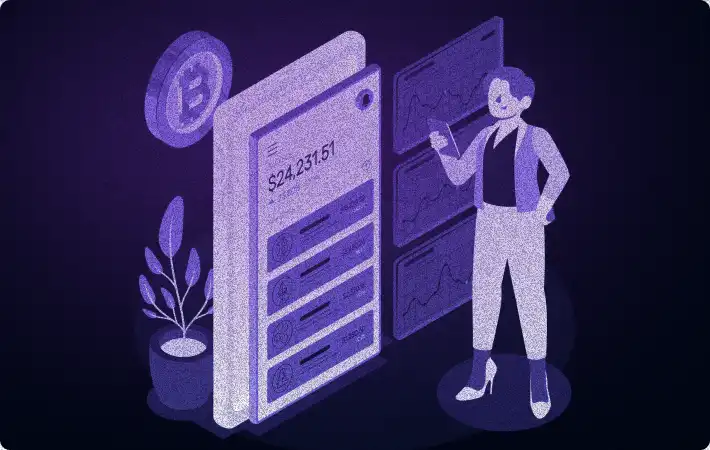How to Find a Crypto Liquidity Provider in 2024?
In the world of cryptocurrencies, understanding the mechanisms behind this advanced and robust technology is crucial, especially for those looking to harness its potential in various sectors. A key aspect of this digital currency landscape is its nature as a tradeable asset, characterized by significant growth and value fluctuations. This article dives into the intricacies of cryptocurrency liquidity and how to effectively find a crypto liquidity provider in 2024.
Understanding the Role of Crypto Liquidity Providers
Liquidity in financial markets, though often overlooked, plays a pivotal role in determining prices and ensuring market stability. A crypto liquidity provider (LP) is instrumental in maintaining this equilibrium by supplying sufficient assets and funds for trading. These providers facilitate the buying and selling of securities, contributing to the market's supply levels. High liquidity markets are marked by efficiency, lower spread levels, and minimal slippage rates. Conversely, low liquidity can lead to trade delays, increased slippage, and inefficient market conditions.
The Essence of High Liquidity in Cryptocurrency Markets
Despite the inherent volatility in the crypto market, liquidity providers are vital in ensuring a semblance of stability. Cryptocurrencies, being speculative and not backed by centralized authorities, are subject to rapid value changes influenced by regulatory news, corporate adoption, and innovative breakthroughs. Liquidity providers, ranging from financial institutions to corporations, play a key role in enhancing market liquidity. They actively trade assets and leverage various exchange platforms and liquidity pools.
Selecting a Reliable Cryptocurrency Liquidity Provider
Choosing the right crypto LP is a critical decision impacting your trading endeavors. Consider the following factors when selecting a provider:
Pricing Policy: Assess the pricing plans of various LPs, ensuring they align with your business needs and budget. Opt for a provider offering competitive services at a reasonable cost.
Regulation Compliance: Prioritize LPs that comply with financial regulations, especially if operating globally. This approach mitigates risks and ensures the reliability of your liquidity source.
Reputation and Client Feedback: Investigate the reputation of potential LPs through client testimonials and feedback. This insight can reveal the true nature of a provider's service quality and reliability.
Service Offerings: Examine the range of services and solutions offered by liquidity providers. Ensure their offerings match your specific trading requirements and expectations.
The Impact of Liquidity on Crypto Exchanges
For crypto exchanges, partnering with a competent LP is crucial for operational efficiency. Such collaborations allow access to larger liquidity pools, facilitating a diverse range of cryptocurrencies and tokens for trade with minimal slippage. High market liquidity also translates to lower trading costs, tighter spreads, and more efficient order executions, enhancing the overall trading experience for investors.
Leveraging Advanced Software Solutions for Optimal Crypto Liquidity Management
In the intricate and fast-paced world of cryptocurrency trading, the significance of efficiently managing liquidity cannot be overstated. Traditional liquidity models often face challenges such as limited asset coverage, price discrepancies, and delayed order execution, which can hinder the overall trading experience and profitability. To address these challenges, innovative software tools like WL Global's Crypto Liquidity Aggregator emerge as game-changers in the realm of digital asset trading.
The Power of WL Global's Crypto Liquidity Aggregator.
WL Global's Crypto Liquidity Aggregator is a state-of-the-art software solution designed to amass and manage liquidity for crypto exchanges across a vast array of digital instruments. This tool stands out for its ability to seamlessly integrate with multiple liquidity sources, offering a comprehensive and efficient approach to liquidity management.
Overcoming Traditional Liquidity Challenges.
- Limited Asset Coverage: Traditional models often struggle to provide a wide range of assets, limiting traders' options. WL Global’s aggregator counters this by connecting with numerous liquidity providers, thereby offering access to a broader spectrum of cryptocurrencies and tokens.
- Price Discrepancies: Price disparities across different platforms can be a significant hurdle. The aggregator mitigates this by pooling prices from various sources, ensuring that traders receive the most competitive rates available in the market.
- Delayed Order Execution: Inefficient order execution is a common problem in less liquid markets. The aggregator's advanced algorithms ensure rapid order matching and execution, minimizing delays and reducing the risk of slippage.
- Scalability Issues: As trading volumes grow, traditional systems may struggle to keep up. WL Global’s solution is designed for scalability, adeptly handling increasing volumes without compromising performance.
- Fragmented Liquidity Sources: Traditional models often require traders to manually search for liquidity across multiple platforms. The aggregator simplifies this by consolidating multiple sources into a single, user-friendly interface.
Enhanced Trading Efficiency and Profitability.
By addressing these challenges, WL Global's Crypto Liquidity Aggregator not only enhances the efficiency of crypto exchanges but also significantly boosts the profitability of trading activities. Traders benefit from tighter spreads, better price discovery, and faster order execution. This enhanced efficiency attracts more participants to the platform, creating a virtuous cycle of increasing liquidity and trading volumes.
Final Thoughts
In the fast-evolving realm of cryptocurrency trading, understanding and effectively managing liquidity is paramount. For WL Global clients, recognizing the importance of a reliable crypto liquidity provider is a step towards achieving trading success. By considering the factors outlined above, traders can make informed decisions, aligning with a liquidity provider that best suits their needs, ensuring a stable and efficient trading environment.
Contact us if you want to launch a business related to cryptocurrency trading. We are ready to provide a detailed consultation.
FAQs
Q1: What is the role of a crypto liquidity provider, and why is it important to choose the right one?
A crypto liquidity provider (LP) ensures that sufficient assets and funds are available for trading, facilitating efficient market operations. The right LP can offer competitive pricing, rapid order execution, and access to a broad range of assets, significantly impacting trading success and profitability.
Q2: What are the current trends in the crypto liquidity provider landscape in 2024?
In 2024, trends include the integration of AI and machine learning for better price prediction and order execution, a focus on regulatory compliance, and the expansion of decentralized finance (DeFi) solutions. Additionally, there's an increasing emphasis on global market access and the inclusion of a wider array of digital assets.
Q3: What factors should individuals consider when evaluating crypto liquidity providers this year?
Key factors include the breadth of asset coverage, pricing and fee structures, regulatory compliance, the technological sophistication of the platform, and the provider’s market reputation. Additionally, consider the provider's ability to handle high trading volumes and offer tight spreads.
Q4: What are the common challenges faced when searching for a crypto liquidity provider, and how can they be addressed?
Challenges include finding providers with a wide range of assets, navigating complex fee structures, and ensuring regulatory compliance. These can be addressed by conducting thorough research, comparing multiple providers, and seeking recommendations from experienced traders.
Q5: Are there any emerging technologies or innovations in crypto liquidity provision that individuals should be aware of?
Emerging technologies include blockchain-based liquidity solutions, advanced algorithmic trading tools, and the integration of AI for predictive analytics. These innovations offer more efficient trading, enhanced security, and improved market analysis.
Q6: Can you share case studies or success stories of businesses or traders finding success with their chosen crypto liquidity providers?
While specific case studies are proprietary, many businesses have reported success by partnering with LPs that offer a blend of technological innovation, competitive pricing, and comprehensive regulatory compliance, leading to improved trading efficiency and profitability.
Q7: What steps should individuals follow when searching for a crypto liquidity provider?
Start by defining your trading needs and goals. Research and compare different providers, considering their asset coverage, technology, pricing, and regulatory stance. Test their platforms if possible, and seek feedback from other users. Finally, ensure their offerings align with your trading strategy and compliance requirements.
Q8: How important is regulatory compliance in the selection of a liquidity provider, and are there any recent regulatory changes to be aware of?
Regulatory compliance is crucial to ensure the legality and security of trading activities. In 2024, there's a heightened focus on anti-money laundering (AML) and know your customer (KYC) regulations in the crypto space. Staying updated on global regulatory changes, especially in major markets, is essential.
Q9: What are the frequently asked questions individuals should consider when finding a crypto liquidity provider in 2024?
Key questions include: What range of assets does the provider support? What are the fee structures and pricing models? How does the provider ensure regulatory compliance? What technologies are employed for order execution and market analysis? How does the provider handle market volatility and large trade volumes?



